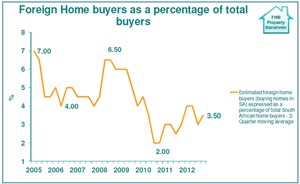
Property Barometer - Emigration and foreign buying
In addition, the industrial action has sometimes been violent, while service delivery protests have also become quite frequent events. Inevitably, South Africa has had ratings downgrades from various global ratings agencies, undoing some of the good work that had led to upgrades a number of years ago in more positive times.
The recent turbulence has also in part contributed to a bout of rand weakness. Clearly, there appears to be heightened investor concern regarding South Africa's future stability and prosperity.
These negative developments potentially affect the residential property market in a few ways, including:
- Higher costs of borrowing for South Africa, should they occur due to rating downgrades or heightened risk perceptions by investors, have the potential to restrict economic growth to lower levels than would otherwise have been the case, which is negative for job creation and household purchasing power growth.
- In addition, pressure on the rand can increase imported prices and thus exert some upward pressure on consumer prices. This has the potential to eat into household disposable income.
- Due to upward pressure on consumer price levels, rand weakness also raises the risk of interest rate hiking, although as yet, the rand weakness has probably not been significant enough to warrant rate hikes.
- But while the above mentioned factors can be seen as potential "indirect" impacts on the residential market via negative impacts on purchasing power, there can also be "direct impacts on the residential market. These would occur due to changes in sentiment of local home owners, causing a greater amount to consider emigration, as well as due to a deterioration in aspirant foreign property investor confidence, causing a weakening in foreign buying of local property. The propensity to emigrate amongst skilled South Africans is traditionally high, and this impact on the property market thus has the potential to be significant. The 2008 "spike" in emigration-related selling at around the time of the Eskom "crisis", at 20% of total selling, reflects this propensity.
Have we seen any possible signs of such direct negative effects on the residential property market to date, emanating from recent negative developments? Fortunately, through 2012 the answer continued to be "not really", according to our FNB Estate Agent Surveys. In the survey, one of the questions we ask the sample of agents is what estimated percentage of sellers sell properties in order to emigrate.
Interestingly, this percentage dropped even further from 4% of total sellers in the 2nd quarter to 3% in the 3rd and 4th quarters, the lowest emigration selling percentages estimated since the start of this survey question at the beginning of 2008. For 2012 as a whole, average emigration-related home selling was estimated at 3.4% of total selling, down from 4.1% in 2011.
Does this mean that the perceptions of domestic homeowners towards South Africa are fine, and that all this hype about negative sentiment is overdone? Probably not. Rather, it is South Africa's "relative situation" in a troubled world that is perhaps not too bad,
The currently weak global economic times probably masks any changes in sentiment towards South Africa, because even if a heightened number of domestic homeowners were feeling a desire to emigrate in recent times, job prospects in some of the traditionally popular emigration destinations are far from rosy, especially European destinations.
With regard to foreign buyers, the 2-quarter moving average (we use a 2-quarter average done for smoothing purposes) for the 4th quarter actually showed some improvement from 3% of total buyers of local residential property to 3.5%.
While this remains far from the highs of 6.5% back in 2008, it is a little better than the 2% low reached in late-2010. For 2012 as a whole, the average foreign buying estimate was 3.8% of total buying, up from 2011's estimated 3%.
Financial times in economies such as Europe and the UK, from where a significant portion of SA's foreign buyers come, are currently tough, and that could conceivably be putting pressure on foreign buying, so improvements in this source of residential demand have been slow.
According to the estate agent sample, however, one group which doesn't appear to be affected by recent tensions is foreign buyers from African countries. Expressed as a percentage of total foreign buyers, the African contingent has increased further to 22% for the 2 quarters to the 4th quarter of 2012. This continues an upward trend in this percentage from a low of 8.5% back in the 3rd quarter of 2010.
In short, therefore, with regard to emigration selling of local property we do not appear to be seeing any negative impact (increase) from recently heightened domestic tensions. But it is important to understand that our "brain drain" problem has probably NOT permanently subsided. In different (better) global economic times, the negative impact may have been far more significant, as was the case in pre-recession early-2008 during the Eskom load shedding period, when many feared that the "lights were going out".



















